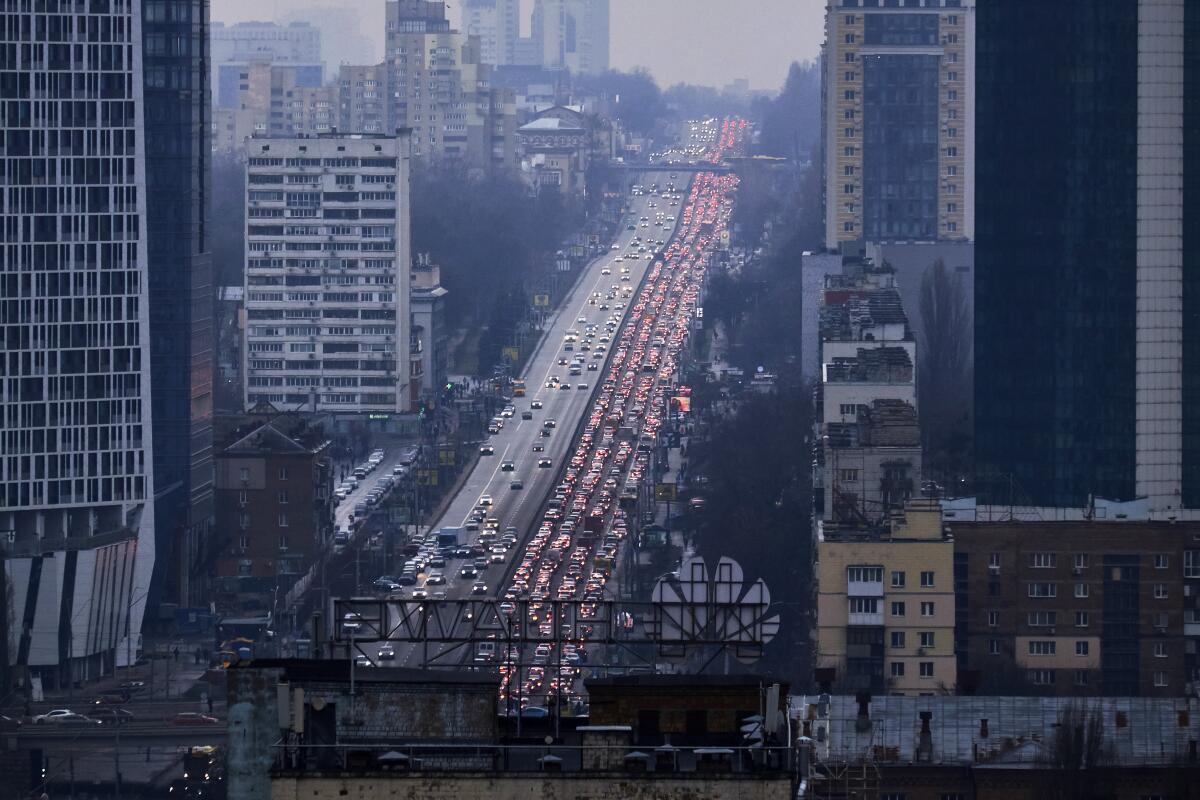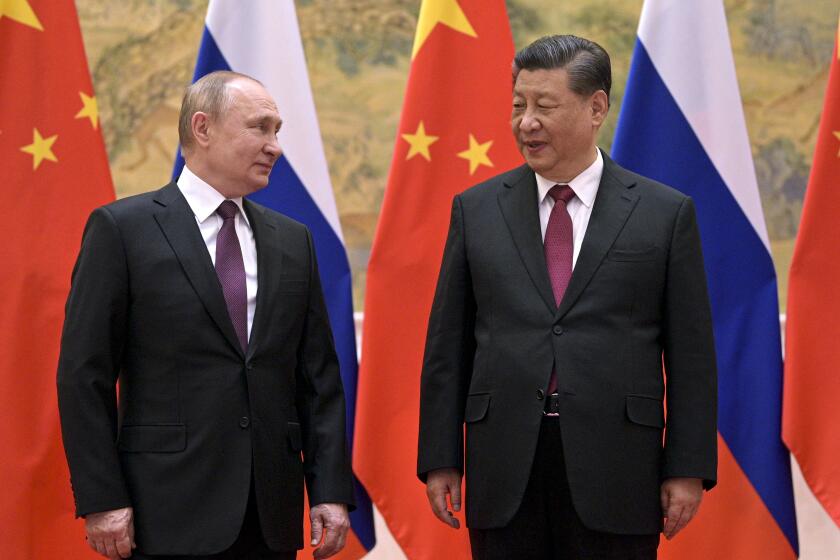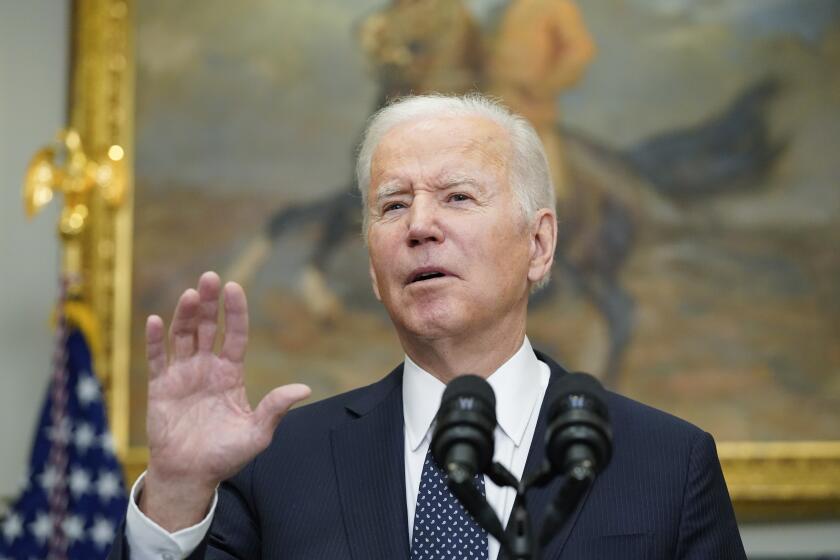As Russia unleashes war in Ukraine, world leaders condemn attack

- Share via
LONDON — As explosions battered Ukraine on Thursday, leaders from across the globe decried Russian President Vladimir Putin’s decision to launch an unprovoked military invasion on a continent that many believed had long ago shaken off the scourge of war.
In Colombia, President Ivan Duque called the invasion “a threat to world peace.”
In Germany, Chancellor Olaf Scholz condemned the attack as an attempt to redraw Europe’s borders and “wipe an entire country off the world map.”
And in Britain, Prime Minister Boris Johnson called on other nations to come to the aid of a “country that for decades has enjoyed freedom and democracy and the right to choose its own destiny.”
“We, and the world, cannot allow that freedom just to be snuffed out,” he said.
The chorus of harsh rebukes, coupled with new rounds of economic sanctions that aim to isolate Moscow and weaken its war effort, belied an anxiety over what the Ukraine invasion means not just for Europe, but for the global world order.
“What is at stake is the stability of Europe and the whole international order,” said Ursula von der Leyen, the president of the European Union’s executive arm.
Despite a common hostility toward the U.S., Chinese leader Xi Jinping may not want to hurt his own economic interests by helping Russia too much.
Some leaders voiced a fear that Putin’s attacks could encourage similar transgressions from other authoritarian governments. Bolstering those concerns — and contributing to the sense of a growing global rift — were the tepid reactions of some of Russia’s top allies, including China, which declined to condemn Russia’s actions and moved Thursday to approve imports of wheat from Russia, a move that could reduce the impact of Western sanctions.
Speaking at a regularly scheduled news conference, Chinese Foreign Ministry spokeswoman Hua Chunying refused to call the assault on Ukraine an “invasion,” saying that the term is “prejudiced” and that the conflict was the result of “a very complicated historical background.”
“This is perhaps a difference between China and Westerners,” Hua said. “We won’t go rushing to a conclusion.”
China and Russia, which have fortified political and economic ties in recent years, share a frustration over what they believe is the unfair American influence in world affairs as well as the eastward expansion of NATO, the U.S.-European military alliance.
China’s reaction to the crisis is being closely watched because of its long-standing desire to take control of Taiwan, a self-governing island that Beijing considers a breakaway territory.
Other Russian allies, such as Iran and Venezuela, also failed to condemn the invasion, with Venezuelan President Nicolas Maduro saying his country would give its full support to Putin “in his brave defense of his people and his homeland.”
Still, across much of the world, official reaction to the invasion was outrage, with Russia condemned by both right-wing and leftist governments across Latin America, Africa and Asia.
“I will call it what it is,” said Australian Prime Minister Scott Morrison, who said his nation was issuing sanctions against Russia that would take effect Friday. “The Russian government launched a brutal invasion, unprovoked.”
In Japan, Prime Minister Fumio Kishida condemned what he termed a “full-scale invasion,” saying “the Russian attack shakes the foundation of the international order.”
Japan, which has a long-running territorial dispute with Russia near its northern prefecture of Hokkaido, said it was considering releasing oil reserves to help blunt the sharp rise in crude prices, which reached $100 a barrel for the first time since 2014.
Everyday citizens also condemned the invasion, some taking to the streets to make their feelings known.
In Washington, protesters wrote “murder” in red paint on the driveway outside the Russian Embassy.
In Berlin, thousands gathered at the Brandenburg Gate, which marked the division between East and West Berlin during the Cold War, chanting: “Stop Putin, stop war.”
In London, hundreds of demonstrators gathered outside Downing Street to call on the British government to do more to stop Russian aggression. Many were Ukrainians living in London who said they were “heartbroken” and “terrified” at the unfolding news. Some held signs showing an image of Putin with blood on his hands.
President Biden announces stiffer sanctions against Moscow on Thursday over Russia’s invasion of Ukraine.
Opposition to Russia’s attack, the harshest military action in Europe since World War II, was particularly strong across the continent.
“Innumerable missiles and bombs have been raining down on an entirely innocent population,” Johnson said in a somber video address in which he announced he was freezing the assets of all large Russian banks and barring Russian companies and the Kremlin from raising money on British markets.
“This hideous and barbaric venture of Vladimir Putin must end in failure,” he said.
On the streets of London, where some can still remember the drone of air raid sirens more than 75 years ago, images of Ukrainians huddling in subway stations to protect themselves from bombs were unsettling.
Irina Hallett, 72, a Russian native who lives in London, said she had to turn off news of the invasion because it was too upsetting.
For the record:
7:23 a.m. Feb. 25, 2022A previous version of this story misidentified a woman interviewed in London. Her surname is Hallett, not Jarrett.
“For me, it’s devastating,” she said. “It upsets me so much. It’s just full-scale war.
“I don’t know how a monster like this could exist and rewrite history,” she said of Putin. “He wants a war and he will have a war.”
Ruediger Jaeger, 55, of Berlin said he was terrified.
“I’ve never experienced anything as dangerous as this in my lifetime,” he said. “This feels a bit like the early 1980s during the Cold War. That was already pretty scary, but now bombs are are falling just 1,300 kilometers away.”
Others were concerned about the economic impact of the war, which momentarily sent stocks tumbling and oil prices surging amid fears of higher costs for food and fuel. In Europe, some also braced for a possible wave of Ukrainian refugees fleeing west for safety.
“I’m worried that hundreds of thousands of asylum seekers will end up coming to Germany,” said Joerg Quitt, 60, an engineer in Berlin.
The European Union says it is prepared for that eventuality — mindful of the 2015 migrant crisis that saw 1 million newcomers, many of them escaping warfare in Syria, arrive on European shores and lead to bitter divisions within the 27-nation bloc.
“We have, with all the front-line member states, now explicit contingency plans to welcome and host immediately those refugees from Ukraine” who start arriving, Von der Leyen said Thursday.
Linthicum reported from Mexico City, Chu from London and Pierson from Singapore. Special correspondents Christina Boyle in London, Erik Kirschbaum in Berlin and Cecilia Sanchez in Mexico City contributed to this report.
More to Read
Sign up for Essential California
The most important California stories and recommendations in your inbox every morning.
You may occasionally receive promotional content from the Los Angeles Times.















